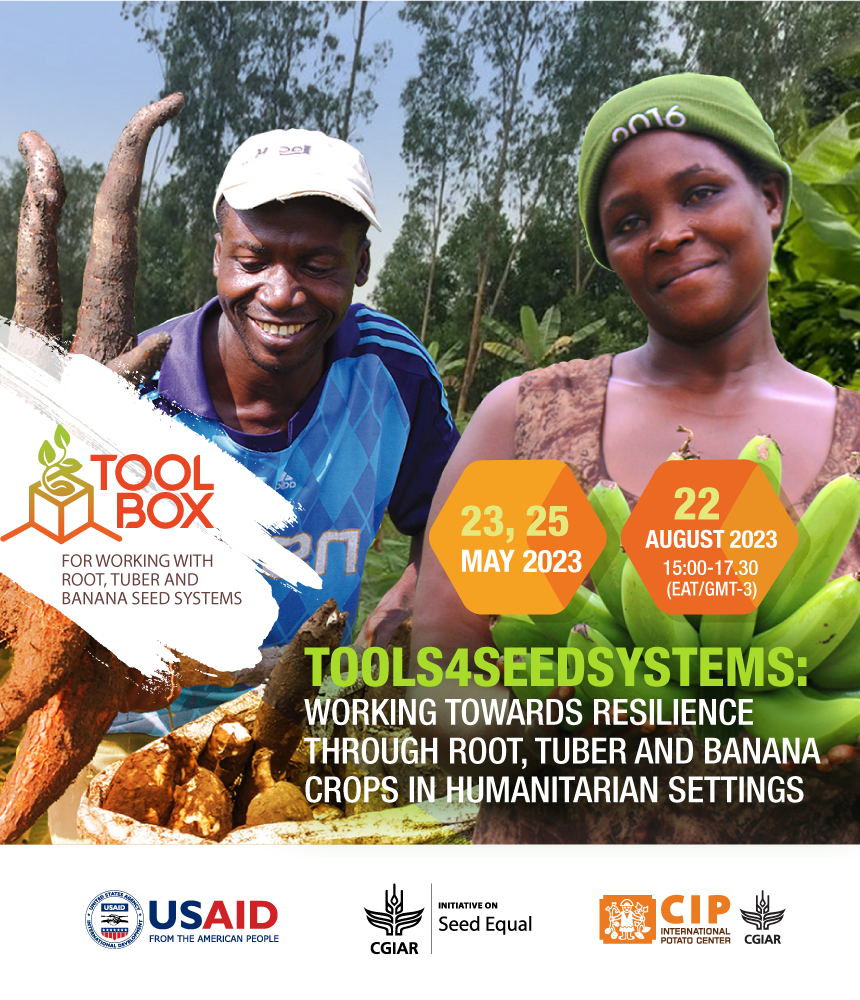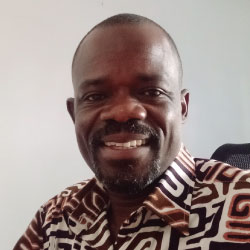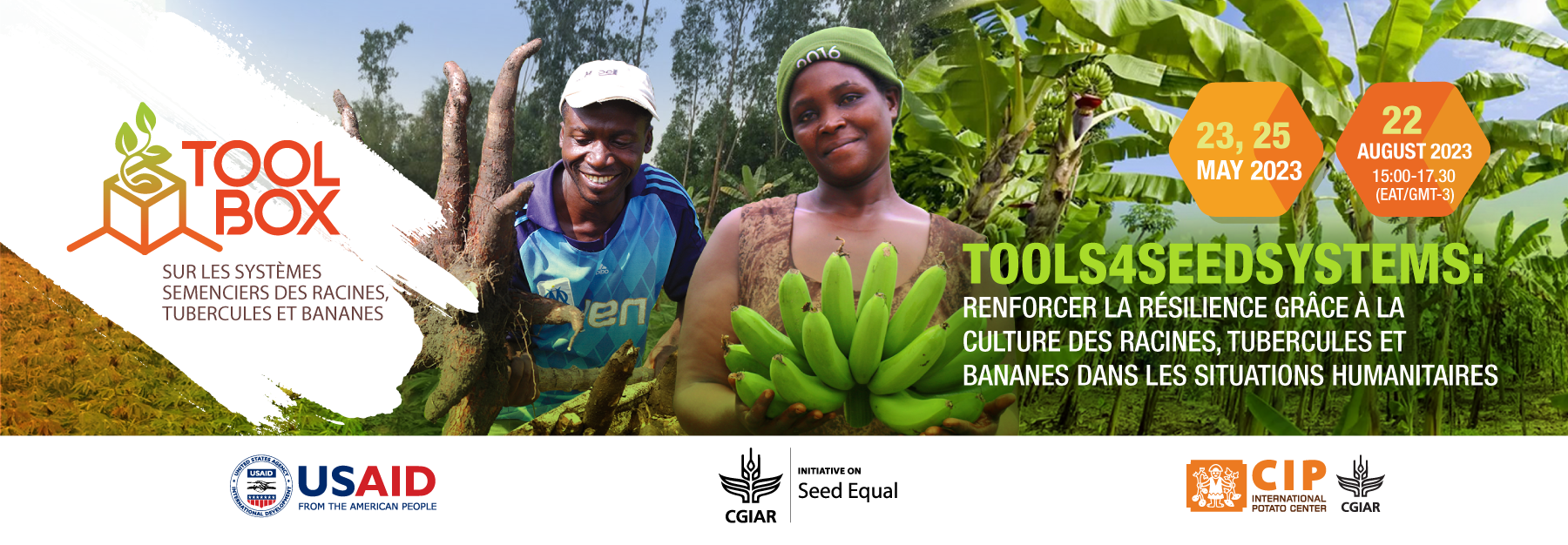Share to:

Tools4SeedSystems: working towards resilience through root, tuber and banana crops in humanitarian settings
Sharing experiences from the Democratic Republic of Congo and Cameroon
In post-conflict complex humanitarian situations, there is consensus for the need to “build back better” and support efforts to strengthen resilience among farmer groups who are vulnerable to the impact of climate-related shocks. In many contexts (e.g., the Great Lakes region in sub–Saharan Africa), roots, tubers, and bananas (RTB) are crucial crops for food security, nutrition, and income. RTB crops are versatile, nutritious staples that produce more food per unit area of land compared to many other crops, contribute directly to household food security, are often under women’s management, and are projected to be more climate resilient than grain crops. Yet, there is often limited awareness among humanitarian actors of the current role and contribution of RTB crops in local farming systems to re-build better, sustainable livelihoods.
The RTB Toolbox was launched in 2021. In 2022-2023 we have been working to understand the capacity needs of humanitarian partners to strengthen their root, tuber and banana interventions in Cameroon, Democratic Republic of Congo (DRC), Ethiopia, Madagascar, Mozambique, Haiti and Bangladesh.
We hosted a two-day virtual workshop May 23rd and May 25th, 2023. The objectives were to introduce RTB crops and seed systems and the RTB Toolbox as a set of evolving resources to understand seed systems and to improve interventions; and develop a better understanding of the specific context for humanitarian interventions and what this might mean for types of RTB seed production, and enhancing RTB seed quality,
We are now pleased to invite you to a third session on August 22nd, 2023. Here we aim to share experiences and capture insights from field implementation in DRC and Cameroon. Welcome!
Language: English with simultaneous translation to French available.
JORGE ANDRADE
Jorge Andrade is a plant pathologist at the International Potato Center (CIP) and the CGIAR Research Program on Roots, Tubers, and Bananas. He specializes in potato seed systems and late blight epidemiology with more than 20 years of experience in the Andes and several countries in Africa and Asia. Jorge holds a PhD in Plant Pathology from Cornell University in New York.
JORGE ANDRADE PIEDRA
Senior Scientist
International Potato Center
DOUDOU DUNIA
Doudou is a socio-economist working at IITA Bukavu for more than 8 years, he is involved in conducting and analyzing impact studies, value chains for agribusiness development and food security in the Grand Lac region and in DRC in particular. He conducted a baseline study of the Cassava21 project in Kinshasa City Province and its peripheries, Kwango Province, Kwilu Province and Central Kongo Province in DRC and in three provinces in Cameroon. He also worked with Food for hungry (Fh) in household surveys on Bacterial Wilt (BXW) identification and treatment methods in the chiefdoms of Ngweshe, Kaziba, Ciherano and Mwenga. He began his career with Louvain Coopération in the monitoring and evaluation of a food security project in Louvain Coopération’s intervention sites in South Kivu.
DOUDOU DUNIA
Socioeconomist and Project Assistant
IITA Bukavu
PAUL DONTSOP
PAUL DONTSOP
Project Coordinator and Impact Economist DRC-Bukavu
IITA
VICTORINE FORNKWA
Victorine Fornkwa is a Potato Specialist at the International Potato Center based in Bafoussam, Cameroon. Victorine has over 15 years’ experience working in Research for Development teams with focus on crop improvement through plant biotechnology techniques and value chain development in Cameroon. She has participated in the capacity building of stakeholders across value chains like potato, banana, plantain, yam and cassava. Before joining CIP, Victorine worked as a tissue culture specialist in IITA and IRAD Cameroon. She has a MSc in Biochemistry and is currently pursuing a PHD in the University of Yaoundé I, Cameroon focusing on potato disease diagnostics and biocontrol.
VICTORINE FORNKWA
Potato Specialist – NRS SSA Research, Cameroon
International Potato Center
ABBY LOVE
Abby Love works on the Agriculture Systems Technical Support Unit at Mercy Corps, providing support to program design, development and implementation. Previously, she co-led Mercy Corps’ work on the Integrated Seed Sector Development in Africa (ISSD Africa) program, focusing on seed systems in emergency settings and conflict-affected areas, and led the capacity strengthening efforts on the USAID/BHA-funded SCALE Award. Abby has an MS in Agricultural and Applied Economics and a BSES in Environmental Economics and Management.
ABBY LOVE
Mercy Corps
MARGARET MCEWAN
Margaret McEwan is a Senior Scientist at the International Potato Center’s regional office for Africa based in Kenya. A social scientist, Margaret has over 30 years’ experience working in multi-disciplinary teams focused on rural development, farming systems research, household food security and nutrition in Kenya, Uganda, Somalia, North Sudan, Zambia and Mozambique. In research for development contexts she is concerned with how to engage multi-stakeholder partnerships in ensuring improved livelihood and nutrition outcomes, and in understanding the conditions required to up-scale technologies for greater impact. She has a MSc in Human Nutrition and is currently pursuing a PhD at Wageningen University and Research, in the Netherlands, focusing on the social-technical interactions which influence the institutional arrangements for sustainable sweetpotato seed systems.
MARGARET MCEWAN
Senior Scientist
International Potato Center
CHRISTOPHER OJIEWO
Ojiewo is a skilled professional with about 20 years’ experience in international agricultural research focusing on basic, applied and adaptive plant breeding and seed systems research and development aimed at developing and delivering high-yielding, nutrient-dense, climate-smart, market-preferred varieties of vegetables, legumes and cereals. Chris Ojiewo is the Seed Equal Initiative Lead under the One CGIAR Action Area on Genetic Innovation. He also leads Strategic Partnerships and Seed Systems for Dryland Crops at CIMMYT. He is co-chair for The Steering Group of the Africa Seed and Biotechnology Partnership Platform as well as the Chair for the Working Group on Seed Quality Assurance and Certification Systems. Currently he’s leading a transition process for Accelerated Variety Improvement and Seed Delivery for the Dryland Crops in Africa (AVISA) from a bilateral project into the OneCG Initiative System. Chris started his international agricultural research career as a technician on Vegetable IPM at ICIPE shortly after his undergraduate studies. He has worked on plant breeding and seed systems of several crops, starting his breeding/seed systems career as a scientist vegetable breeding/seed systems at the Word Vegetable Center before joining ICRISAT first as a scientist – groundnut breeding/seed systems then as senior scientist – chickpea breeding/seed systems and later as Principal Scientist and Research Cluster Leader for Seed Systems under the Accelerated Crop Improvement Program. Chris coordinated/led the development and implementation of Tropical Legumes (TLIII), HOPEII ( for cereals) and AVISA projects. His role in these projects involved 1) Discovery, applied and delivery research for legume and vegetable crop improvement targeting smallholder farmers, 2) backstopping national research programs especially in Eastern and Southern Africa in their crop improvement and deployment activities, 3) seeking project research funding, writing research proposals and reports and maintaining contacts with donors/investors, 4) long term training and co-supervision of MSc and PhD students 6) offering short training courses to technicians, extension staff and farmers 7) convening international workshops on topical issues and 8) co-developing national agricultural subsector strategies and policies. Chris has wide work experience in Africa and Asia, including Japan, Tanzania, Malawi, Ethiopia and Kenya, besides coordinating projects with partnership in Malawi, Mozambique, Zambia, Zimbabwe, Tanzania, Ethiopia, Kenya, Uganda, Rwanda, Burundi, Ghana, Nigeria, Burkina Faso, Niger, Mali, Senegal, India, Bangladesh, Myanmar, Taiwan. Together with various co-workers, he has researched and published over 100 scientific, technical and policy articles covering 1) Plant Developmental Biology 2) Plant Genetics 3) Plant Breeding 4) Horticulture 5) Crop Propagation and Seed Systems 6) Germplasm Characterization for Enhanced Management and Conservation, and 7) Food and Nutrition Security and Policy. Chris obtained his PhD from Okayama University, Japan, 2007 (Plant Breeding); M.Sc., Okayama University, Japan, 2005 (Plant breeding); BSc. (1st Class Honors), JKUAT, Nairobi, Kenya 2001 (Horticulture). He also did a post-doc at the same university (2007-2008).
CHRISTOPHER OJIEWO
Seed Equal Initiative Lead under the One CGIAR Action Area on Genetic Innovation

AMAN OMONDI
Scientist II
Alliance of Bioversity International and CIAT
KWAME OGERO
Kwame Ogero is a Regional Research Associate at the International Potato Center (CIP), based in Mwanza, Tanzania. His work focuses on developing crop-specific models and decision support systems for understanding and managing seed degeneration in sweetpotato. This includes identifying scenarios whereby on-farm management, resistant varieties, and seed replacement management strategies would be most optimal within a sustainable seed system. He serves on the Committee of the International Society for Tropical Root Crops – Africa Branch (ISTRC – AB) as the Eastern Africa Representative. Before joining CIP, Kwame worked at ISAAA AfriCenter as a Program Assistant for the Open Forum on Agricultural Biotechnology in Africa (OFAB), Kenya Chapter. He holds a PhD from Wageningen University & Research (WUR), Wageningen, Netherlands, a MSc. degree in Agronomy from Kenyatta University and a BSc. Degree in Biochemistry from the University of Nairobi, both in Nairobi, Kenya.
KWAME OGERO
Regional Research Associate
International Potato Center
STEPHEN WALSH
Stephen Walsh is a senior agricultural advisor with the office of technical and program quality with USAID’s Bureau of Humanitarian Affairs, formerly Office of Foreign Disaster Assistance (OFDA). He serves as the technical lead for two operational research grants aimed at improving small holder farmer access to seed technologies in humanitarian contexts. Prior to joining USAID he worked for several years designing, implementing, managing, and providing technical support for seed system activities and programs—for both true seed and vegetative propagated crops—for smallholder farmers. His seed system interest areas include how to build more responsive demand driven seed systems, promoting public and private sector engagement with an emphasis on small and informal sector actors, and strengthening the analytic tools and capacity of practitioners to better understand and design seed systems interventions.
STEPHEN WALSH
Senior agricultural advisor
USAID
SUE CANNEY
Sue Canney Davison PhD is a co-Founder/Director of Pipal Ltd and Radical Facilitation and sis based in Nairobi, Kenya. Sue has over 30 years’ experience researching, designing and facilitating inclusive interactive processes, on-line and face to face, for multi-cultural, multi-disciplinary teams. She has worked particularly for IGOs and NGOs across the agricultural, environmental and renewable energy sectors, as well as extensively across the 1CGIAR. She has a PhD from London Business School, and is currently a Research Associate in the Department of Botany and Plant Biotechnology at the University of Johannesburg, focusing on protecting arid lands NTFP income for rural livelihoods. She is on the Advisory Board of the AIRMID Institute.
SUE CANNEY DAVISON
Director of Pipal Ltd and Radical Facilitation
LEANNE DAVIES
Originally from South Africa, Leanne Davies is an international learning and development specialist; founder of Livelearn UK and co-founder of Radical Facilitation. Currently based in the UK, she has worked with a wide variety of different cultures and organisations in many different sectors. Leanne uses her expertise to assist clients to build effective leaders and teams, both on-line and in person, as well as developing trainers to deliver bespoke training courses. Leanne holds a Post Graduate Certificate in Education in the Lifelong Learning Sector from the University of Greenwich, an Honours Degree in Group Dynamics from the Nelson Mandela Metropolitan University (NMMU) South Africa and is a qualified coach.
LEANNE DAVIES
Founder of Livelearn UK and co-founder of Radical Facilitation
ERIK DELAQUIS
Erik Delaquis is a Research Team Leader with the Alliance of Bioversity International & CIAT, based in Lao PDR. He is currently working on developing sustainable cassava seed systems in Southeast Asia. He has extensive work experience in agronomy and crop improvement in North America, West Africa, South America and Southeast Asia. He is a co-developer of the RTB seed Toolbox
ERIK DELAQUIS
Research Team Leader
Alliance of Bioversity International & CIAT
Welcome, agenda of the day & speed meet and greet
Facilitators
Overview of the project and how the RTB Toolbox has evolved
Margaret McEwan (CIP and Seed Equal)
RTB Tools4SeedSystems, Seed Equal and the One CGIAR
Chris Ojiewo (Seed Equal)
The opportunities and entry points for RTB crops from the perspective of those working in humanitarian settings
Stephen Walsh (USAID BHA)
Feedback on findings from the capacity needs assessment for RTB seed interventions in humanitarian settings and implications for approach and learning from each other
Jorge Andrade-Piedra (CIP and Plant Health Initiative)
Pause and reflect
Facilitators
Break
Break out rooms
Facilitators
Plenary feedback
Facilitators
Evaluation, wrap up, explanation of session 2 on 25th May
Facilitators
Welcome, agenda of the day & speed meet and greet
Facilitators
What do we already know/ best practice for emergency seed system assessments (CAT and SERT)
Abbey Love (Mercy Corps)
Overview summarising input, lessons and in-country planning so far: Cameroon/DRC
Victorine Fornkwa (CIP) and Paul Dontsop (IITA)
Introduction to RTB seed production practices in humanitarian settings (plantain, cassava, sweetpotato)
B.A Omondi (ABC) Kwame Ogero (CIP), Doudou Dunia (IITA)
Break
Introduction to managing seed quality
Kwame Ogero (CIP)
Break out rooms: reflection and discussion on key challenges in the field
Facilitators
Rapid feedback on updated plans and way forward
Facilitators
Evaluation
Facilitators
Welcome, recap on project purpose, speed meet and greet.
Facilitators and Kwame Ogero (CIP and Seed Equal)
Video & Feedback from Cameroon
Bebel Nguepi and Victorine Fornkwa (CIP), and participants from IRAD (SW), Nascent Solutions, (NW), INTERSOS, (Far North) MINADER (NW), CPF, (West)
Feedback from DRC
Doudou Dunia (IITA) and Nzama Djaimbu (INERA)
Plenary discussion and reflections
Alain Ngono (CIP), Kwame Ogero (CIP), Aman Bonaventure (ABC), Srini Rajendran (CIP)
Break
Break out rooms
Facilitators
Plenary feedback
Participants
Evaluation and feedback
Facilitators
MAY 23
MAY 25
This event was made possible through support provided by the Bureau for Humanitarian Assistance, U.S. Agency for International Development, under the terms of Award No. BHA 720BHA22IO00136. The opinions expressed in this event are those of the authors and do not necessarily reflect the views of the US Agency for International Development. This event was made possible through support from CGIAR Seed Equal Initiative. We thank all donors and organizations which globally support its work through their contributions to the CGIAR Trust Fund.

